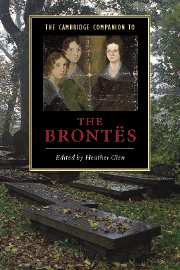Book contents
- Frontmatter
- Introduction
- 1 The Haworth context
- 2 'Our plays': The Brontë Juvenilia
- 3 The poetry
- 4 'Three distinct and unconnected tales': The Professor, Agnes Grey and Wuthering Heights
- 5 'Strong family likeness': Jane Eyre and The Tenant of Wildfell Hall
- 6 Shirley and Villette
- 7 'Getting on': ideology, personality and the Brontë characters
- 8 Women writers, women's issues
- 9 The Brontës And Religion
- 10 The Brontë myth
- Further reading
- Index
- Series List
4 - 'Three distinct and unconnected tales': The Professor, Agnes Grey and Wuthering Heights
Published online by Cambridge University Press: 28 May 2006
- Frontmatter
- Introduction
- 1 The Haworth context
- 2 'Our plays': The Brontë Juvenilia
- 3 The poetry
- 4 'Three distinct and unconnected tales': The Professor, Agnes Grey and Wuthering Heights
- 5 'Strong family likeness': Jane Eyre and The Tenant of Wildfell Hall
- 6 Shirley and Villette
- 7 'Getting on': ideology, personality and the Brontë characters
- 8 Women writers, women's issues
- 9 The Brontës And Religion
- 10 The Brontë myth
- Further reading
- Index
- Series List
Summary
In September 1841, Charlotte Brontë wrote an audacious letter soliciting funds for a European venture:
Who ever rose in the world without ambition? When [Papa] left Ireland to go to Cambridge University, he was as ambitious as I am now. I want us all to go on. I know we have talents, and I want them to be turned to account. I look to you, aunt, to help us.
The eldest Brontë daughter proposed a living narrative of self-improvement, attainable by those who, like the hero of The Professor, direct their energies towards an ambitious goal: 'Hope smiles on Effort!' She requested cash: “the needful”, as it is characterised in the northern industrial idiom of Charlotte's first novel: 'I must live, and to live I must have what you call “the needful”; which I can only get by working' (P, 44). The Professor is a narrative of selfhelp, like Mrs Craik's John Halifax, Gentleman (1856). Pulling oneself up by one's own bootstraps, the practice of frugality and business probity, taking careful initiatives in pursuit of financial independence and security, were major themes in Charlotte's life. Her managing mind initiated the idea of a school, further education in Belgium and the submission of the sisters' first novels in June 1846: a three-volume work comprising 'three distinct and unconnected tales', Charlotte's The Professor (then entitled The Master), Emily's Wuthering Heights and Anne's Agnes Grey (CBL I, 461).
- Type
- Chapter
- Information
- The Cambridge Companion to the Brontës , pp. 72 - 98Publisher: Cambridge University PressPrint publication year: 2002
- 3
- Cited by



